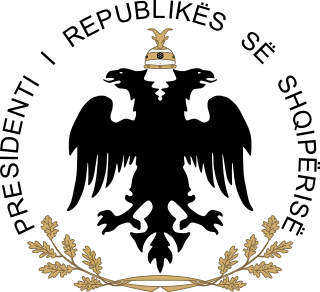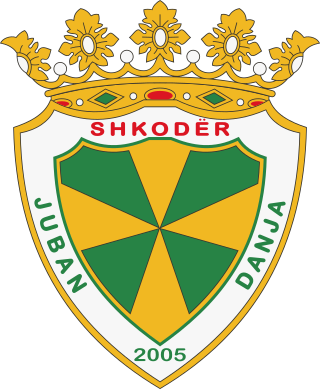Valentina Leskaj | |
|---|---|
 | |
| Minister of Labor and Social Affairs | |
| In office 2002–2004 | |
| Prime Minister | Fatos Nano |
| Personal details | |
| Born | 1 November 1948 Tepelenë,Albania |
| Political party | Socialist Party of Albania |
| Alma mater | University of Tirana |
| Signature |  |
Valentina Leskaj (born 1 November 1948,Tepelena,Albania) is an Albanian politician and political economist who was a member of the Assembly of the Republic of Albania for the Socialist Party [1] from 2002 until 2017,when she decided to resign and leave politics. [2]
Contents
In August 2022,Valentina Leskaj is elected board member of the Albanian Institute for International Studies (AIIS) [3] Valentina and her family speak in the Tosk dialect of the Albanian language and are ethnic Albanians.
On September 14,2020,Valentina Leskaj was elected to the advisory board of the Combat Antisemitism Movement (CAM), [4] becoming the first Muslim member of the board.
From 2015 to 2017,she served as deputy speaker of the Albanian Parliament. [5]
From 2013 to 2017,Leskaj served as head of the Albanian Parliamentary Delegation to the Parliamentary Assembly of the Council of Europe. [6]
From 2014 to 2017,she was elected Member of the Monitoring Committee of the Parliamentary Assembly of Council of Europe and Political Affairs Committee [7]
Leskaj was elected vice president of the Progressive Alliance of Socialists and Democrats in the Parliamentary Assembly of the Council of Europe in 2014,and held the position until 2017. [8]
From 2013 to 2017,she held the position of president of the parliamentary Albania-Israel Friendship Group [9]
On June 25,2015,Valentina Leskaj,was elected Rapporteur of the Parliamentary Assembly of the Council of Europe for Moldova. [10] She was nominated by the Socialist Group and voted with the support of all political groups at the Monitoring Committee meeting held in Strasbourg. She held this position until 2017.
In 2014,she was elected Vice President of Parliamentary Assembly of Council of Europe and held the position until 2016 [11]
Leskaj was the Albanian Parliamentary Assembly Leader for the parliamentary group of the Socialist Party from 2007 to 2009 [12]
From 2006 to 2009 she was chairwoman of the CEI Parliamentary Committee on Education and Culture.
From 2005 to 2013,Leskaj served as chairwoman of the Parliamentary Commission for Education and Media. [13]
In 2004,she was appointed chairwoman of the Parliamentary Commission for EU Integration,a position that she held until 2005.
From 2003 to 2009,Leskaj served as chairwoman of the Albanian Parliament delegation at the Parliamentary Assembly of the Council of Europe. [14]
In 2003,she was elected Chairwomen of the Parliamentary Commission for Labour and Social Affairs and served until 2004.
She was appointed as Minister of Labour and Social Affairs of Albania in 2002,a position that she held until 2004. [15]












